Auditing: Reviewing the Collapse of Enron and Lehman Bros
VerifiedAdded on 2023/04/24
|9
|2783
|316
AI Summary
This article discusses the collapse of Enron and Lehman Bros, the importance of auditor's independence, and the rationale for fee dependency impairs claims for independence. It also talks about the preparation of true and fair statements recognized with the responsibilities of the directors of companies.
Contribute Materials
Your contribution can guide someone’s learning journey. Share your
documents today.
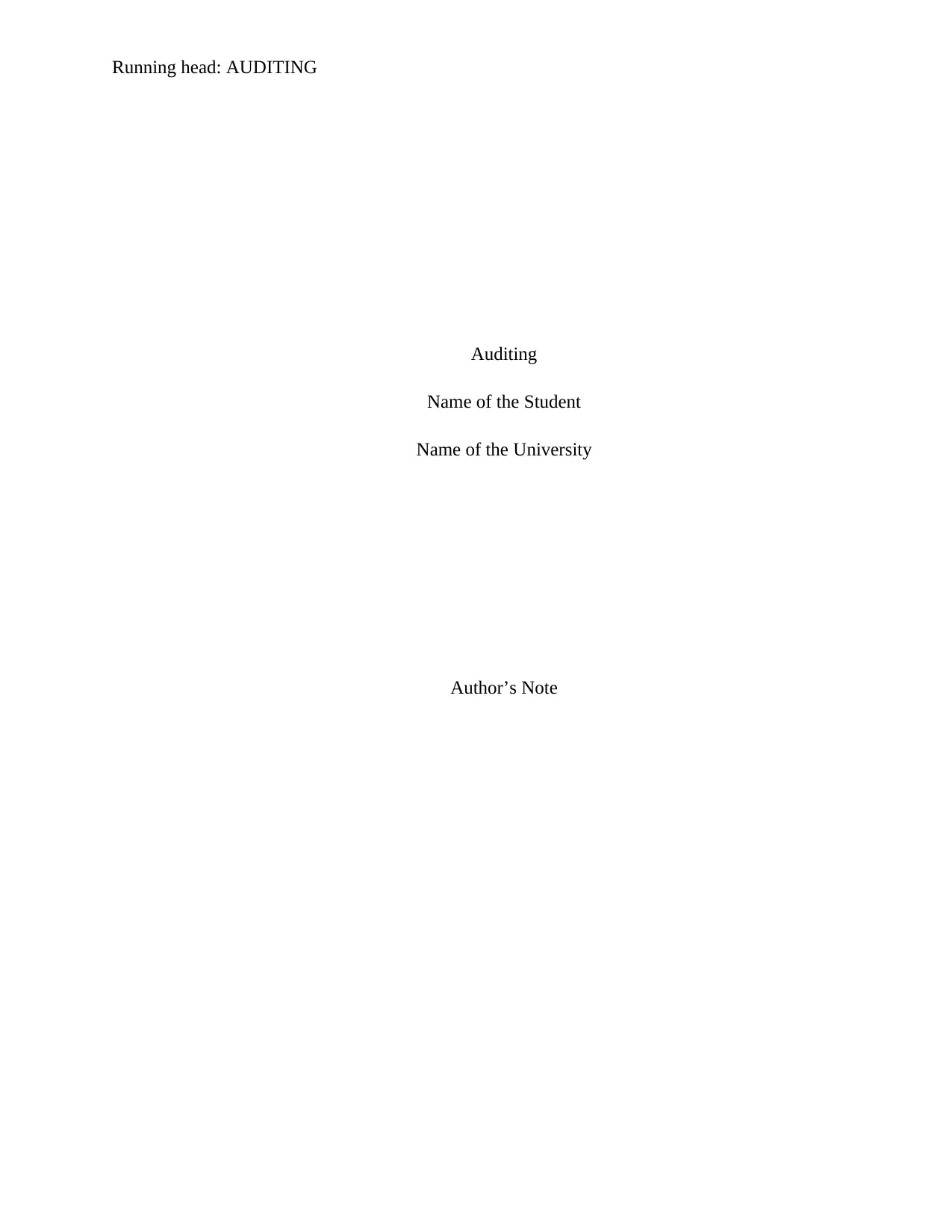
Running head: AUDITING
Auditing
Name of the Student
Name of the University
Author’s Note
Auditing
Name of the Student
Name of the University
Author’s Note
Secure Best Marks with AI Grader
Need help grading? Try our AI Grader for instant feedback on your assignments.
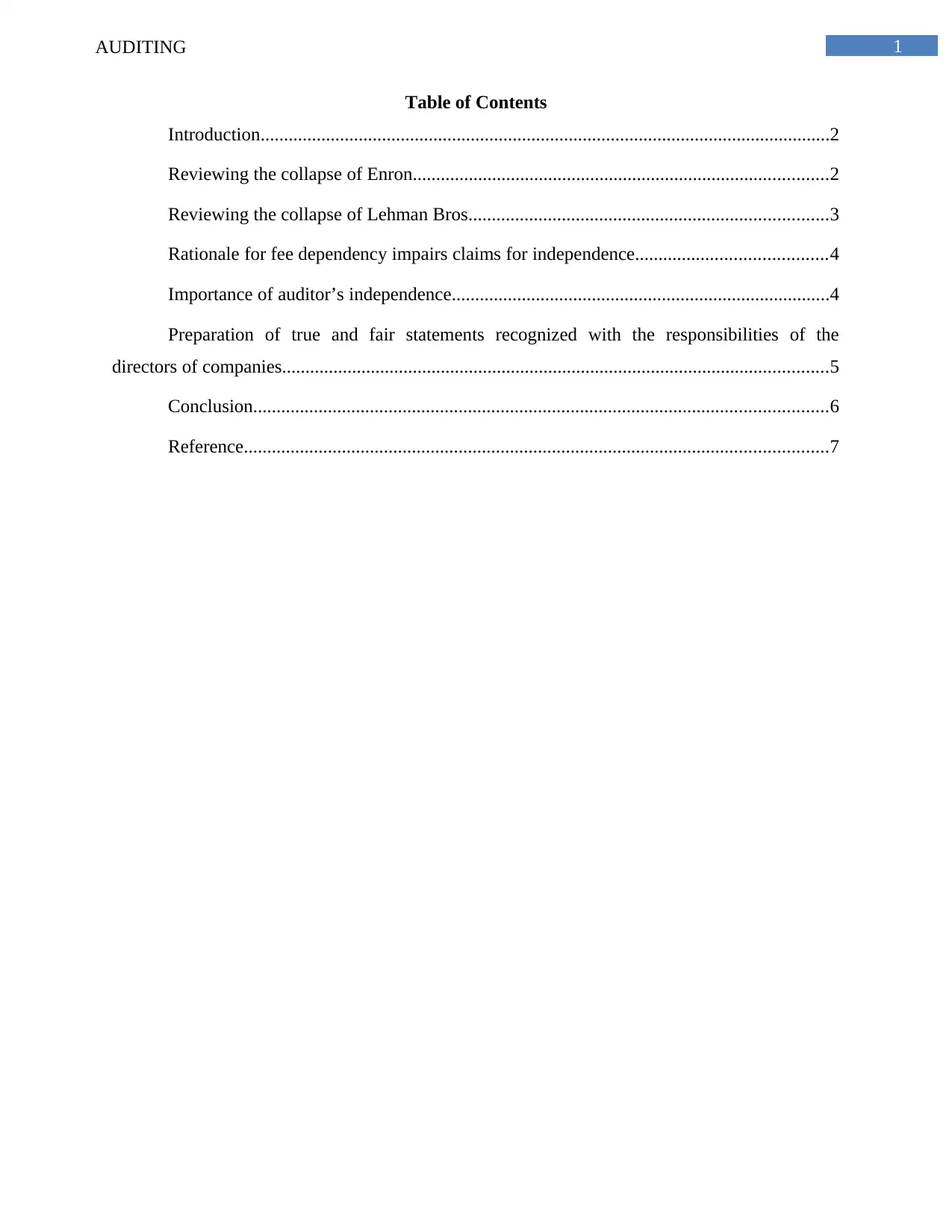
1AUDITING
Table of Contents
Introduction..........................................................................................................................2
Reviewing the collapse of Enron.........................................................................................2
Reviewing the collapse of Lehman Bros.............................................................................3
Rationale for fee dependency impairs claims for independence.........................................4
Importance of auditor’s independence.................................................................................4
Preparation of true and fair statements recognized with the responsibilities of the
directors of companies.....................................................................................................................5
Conclusion...........................................................................................................................6
Reference.............................................................................................................................7
Table of Contents
Introduction..........................................................................................................................2
Reviewing the collapse of Enron.........................................................................................2
Reviewing the collapse of Lehman Bros.............................................................................3
Rationale for fee dependency impairs claims for independence.........................................4
Importance of auditor’s independence.................................................................................4
Preparation of true and fair statements recognized with the responsibilities of the
directors of companies.....................................................................................................................5
Conclusion...........................................................................................................................6
Reference.............................................................................................................................7
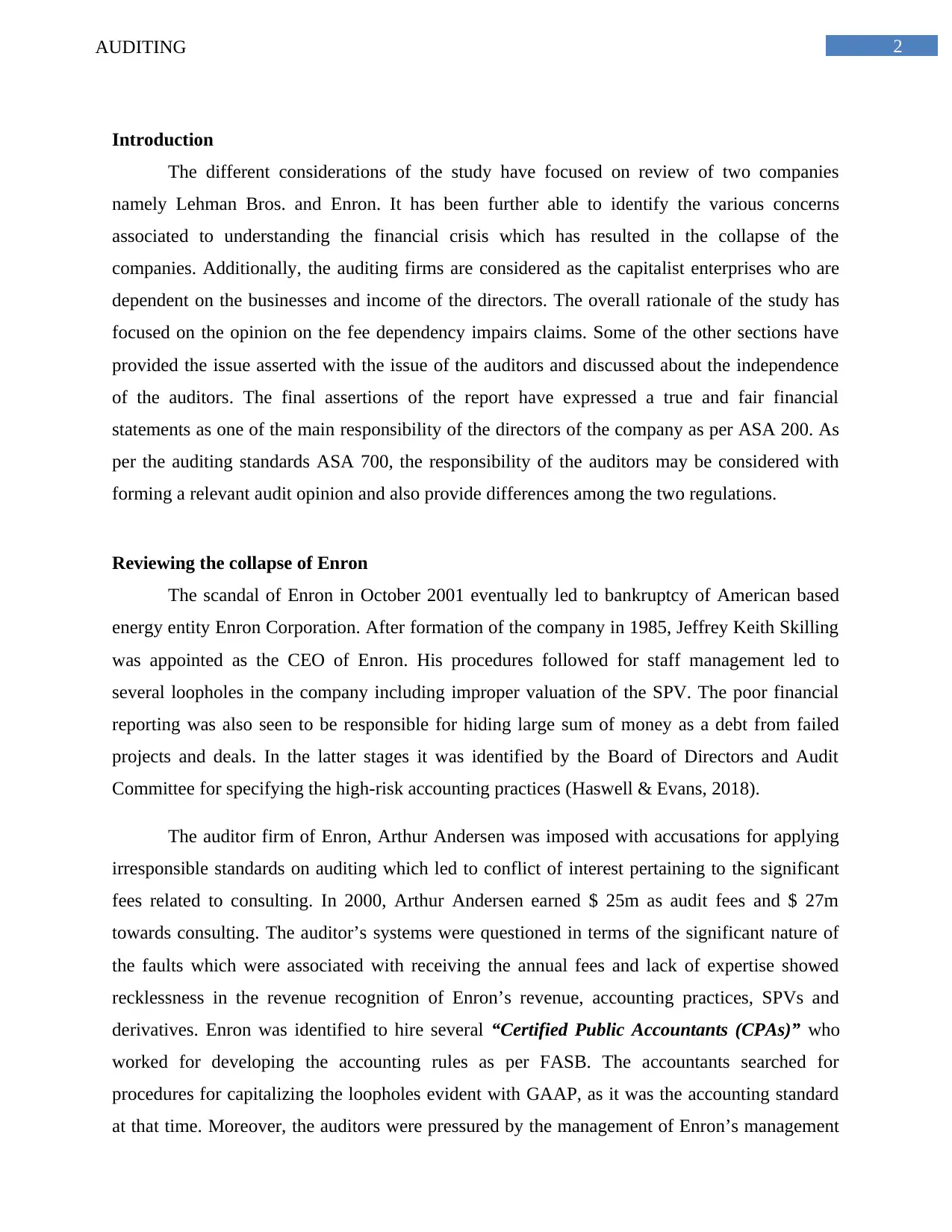
2AUDITING
Introduction
The different considerations of the study have focused on review of two companies
namely Lehman Bros. and Enron. It has been further able to identify the various concerns
associated to understanding the financial crisis which has resulted in the collapse of the
companies. Additionally, the auditing firms are considered as the capitalist enterprises who are
dependent on the businesses and income of the directors. The overall rationale of the study has
focused on the opinion on the fee dependency impairs claims. Some of the other sections have
provided the issue asserted with the issue of the auditors and discussed about the independence
of the auditors. The final assertions of the report have expressed a true and fair financial
statements as one of the main responsibility of the directors of the company as per ASA 200. As
per the auditing standards ASA 700, the responsibility of the auditors may be considered with
forming a relevant audit opinion and also provide differences among the two regulations.
Reviewing the collapse of Enron
The scandal of Enron in October 2001 eventually led to bankruptcy of American based
energy entity Enron Corporation. After formation of the company in 1985, Jeffrey Keith Skilling
was appointed as the CEO of Enron. His procedures followed for staff management led to
several loopholes in the company including improper valuation of the SPV. The poor financial
reporting was also seen to be responsible for hiding large sum of money as a debt from failed
projects and deals. In the latter stages it was identified by the Board of Directors and Audit
Committee for specifying the high-risk accounting practices (Haswell & Evans, 2018).
The auditor firm of Enron, Arthur Andersen was imposed with accusations for applying
irresponsible standards on auditing which led to conflict of interest pertaining to the significant
fees related to consulting. In 2000, Arthur Andersen earned $ 25m as audit fees and $ 27m
towards consulting. The auditor’s systems were questioned in terms of the significant nature of
the faults which were associated with receiving the annual fees and lack of expertise showed
recklessness in the revenue recognition of Enron’s revenue, accounting practices, SPVs and
derivatives. Enron was identified to hire several “Certified Public Accountants (CPAs)” who
worked for developing the accounting rules as per FASB. The accountants searched for
procedures for capitalizing the loopholes evident with GAAP, as it was the accounting standard
at that time. Moreover, the auditors were pressured by the management of Enron’s management
Introduction
The different considerations of the study have focused on review of two companies
namely Lehman Bros. and Enron. It has been further able to identify the various concerns
associated to understanding the financial crisis which has resulted in the collapse of the
companies. Additionally, the auditing firms are considered as the capitalist enterprises who are
dependent on the businesses and income of the directors. The overall rationale of the study has
focused on the opinion on the fee dependency impairs claims. Some of the other sections have
provided the issue asserted with the issue of the auditors and discussed about the independence
of the auditors. The final assertions of the report have expressed a true and fair financial
statements as one of the main responsibility of the directors of the company as per ASA 200. As
per the auditing standards ASA 700, the responsibility of the auditors may be considered with
forming a relevant audit opinion and also provide differences among the two regulations.
Reviewing the collapse of Enron
The scandal of Enron in October 2001 eventually led to bankruptcy of American based
energy entity Enron Corporation. After formation of the company in 1985, Jeffrey Keith Skilling
was appointed as the CEO of Enron. His procedures followed for staff management led to
several loopholes in the company including improper valuation of the SPV. The poor financial
reporting was also seen to be responsible for hiding large sum of money as a debt from failed
projects and deals. In the latter stages it was identified by the Board of Directors and Audit
Committee for specifying the high-risk accounting practices (Haswell & Evans, 2018).
The auditor firm of Enron, Arthur Andersen was imposed with accusations for applying
irresponsible standards on auditing which led to conflict of interest pertaining to the significant
fees related to consulting. In 2000, Arthur Andersen earned $ 25m as audit fees and $ 27m
towards consulting. The auditor’s systems were questioned in terms of the significant nature of
the faults which were associated with receiving the annual fees and lack of expertise showed
recklessness in the revenue recognition of Enron’s revenue, accounting practices, SPVs and
derivatives. Enron was identified to hire several “Certified Public Accountants (CPAs)” who
worked for developing the accounting rules as per FASB. The accountants searched for
procedures for capitalizing the loopholes evident with GAAP, as it was the accounting standard
at that time. Moreover, the auditors were pressured by the management of Enron’s management
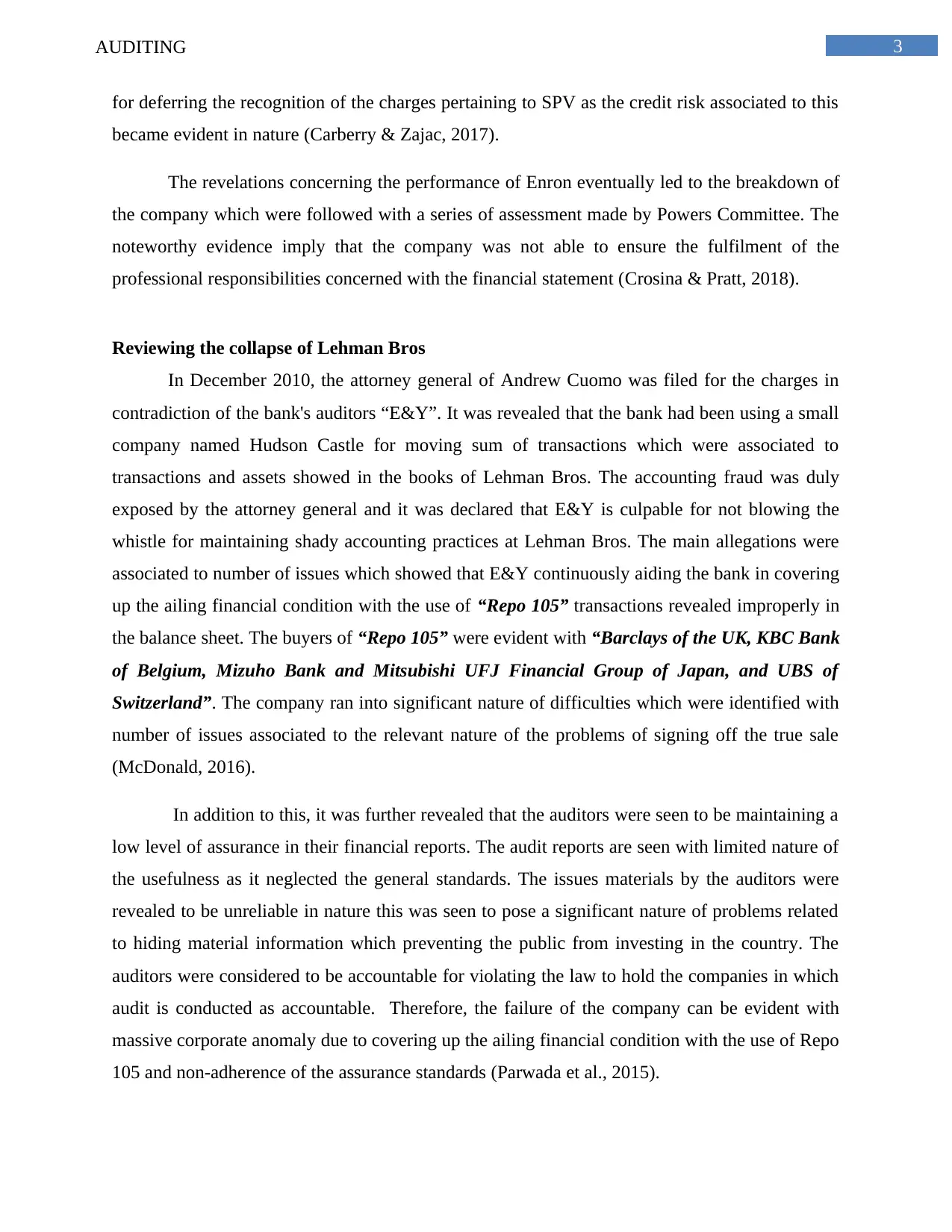
3AUDITING
for deferring the recognition of the charges pertaining to SPV as the credit risk associated to this
became evident in nature (Carberry & Zajac, 2017).
The revelations concerning the performance of Enron eventually led to the breakdown of
the company which were followed with a series of assessment made by Powers Committee. The
noteworthy evidence imply that the company was not able to ensure the fulfilment of the
professional responsibilities concerned with the financial statement (Crosina & Pratt, 2018).
Reviewing the collapse of Lehman Bros
In December 2010, the attorney general of Andrew Cuomo was filed for the charges in
contradiction of the bank's auditors “E&Y”. It was revealed that the bank had been using a small
company named Hudson Castle for moving sum of transactions which were associated to
transactions and assets showed in the books of Lehman Bros. The accounting fraud was duly
exposed by the attorney general and it was declared that E&Y is culpable for not blowing the
whistle for maintaining shady accounting practices at Lehman Bros. The main allegations were
associated to number of issues which showed that E&Y continuously aiding the bank in covering
up the ailing financial condition with the use of “Repo 105” transactions revealed improperly in
the balance sheet. The buyers of “Repo 105” were evident with “Barclays of the UK, KBC Bank
of Belgium, Mizuho Bank and Mitsubishi UFJ Financial Group of Japan, and UBS of
Switzerland”. The company ran into significant nature of difficulties which were identified with
number of issues associated to the relevant nature of the problems of signing off the true sale
(McDonald, 2016).
In addition to this, it was further revealed that the auditors were seen to be maintaining a
low level of assurance in their financial reports. The audit reports are seen with limited nature of
the usefulness as it neglected the general standards. The issues materials by the auditors were
revealed to be unreliable in nature this was seen to pose a significant nature of problems related
to hiding material information which preventing the public from investing in the country. The
auditors were considered to be accountable for violating the law to hold the companies in which
audit is conducted as accountable. Therefore, the failure of the company can be evident with
massive corporate anomaly due to covering up the ailing financial condition with the use of Repo
105 and non-adherence of the assurance standards (Parwada et al., 2015).
for deferring the recognition of the charges pertaining to SPV as the credit risk associated to this
became evident in nature (Carberry & Zajac, 2017).
The revelations concerning the performance of Enron eventually led to the breakdown of
the company which were followed with a series of assessment made by Powers Committee. The
noteworthy evidence imply that the company was not able to ensure the fulfilment of the
professional responsibilities concerned with the financial statement (Crosina & Pratt, 2018).
Reviewing the collapse of Lehman Bros
In December 2010, the attorney general of Andrew Cuomo was filed for the charges in
contradiction of the bank's auditors “E&Y”. It was revealed that the bank had been using a small
company named Hudson Castle for moving sum of transactions which were associated to
transactions and assets showed in the books of Lehman Bros. The accounting fraud was duly
exposed by the attorney general and it was declared that E&Y is culpable for not blowing the
whistle for maintaining shady accounting practices at Lehman Bros. The main allegations were
associated to number of issues which showed that E&Y continuously aiding the bank in covering
up the ailing financial condition with the use of “Repo 105” transactions revealed improperly in
the balance sheet. The buyers of “Repo 105” were evident with “Barclays of the UK, KBC Bank
of Belgium, Mizuho Bank and Mitsubishi UFJ Financial Group of Japan, and UBS of
Switzerland”. The company ran into significant nature of difficulties which were identified with
number of issues associated to the relevant nature of the problems of signing off the true sale
(McDonald, 2016).
In addition to this, it was further revealed that the auditors were seen to be maintaining a
low level of assurance in their financial reports. The audit reports are seen with limited nature of
the usefulness as it neglected the general standards. The issues materials by the auditors were
revealed to be unreliable in nature this was seen to pose a significant nature of problems related
to hiding material information which preventing the public from investing in the country. The
auditors were considered to be accountable for violating the law to hold the companies in which
audit is conducted as accountable. Therefore, the failure of the company can be evident with
massive corporate anomaly due to covering up the ailing financial condition with the use of Repo
105 and non-adherence of the assurance standards (Parwada et al., 2015).
Secure Best Marks with AI Grader
Need help grading? Try our AI Grader for instant feedback on your assignments.
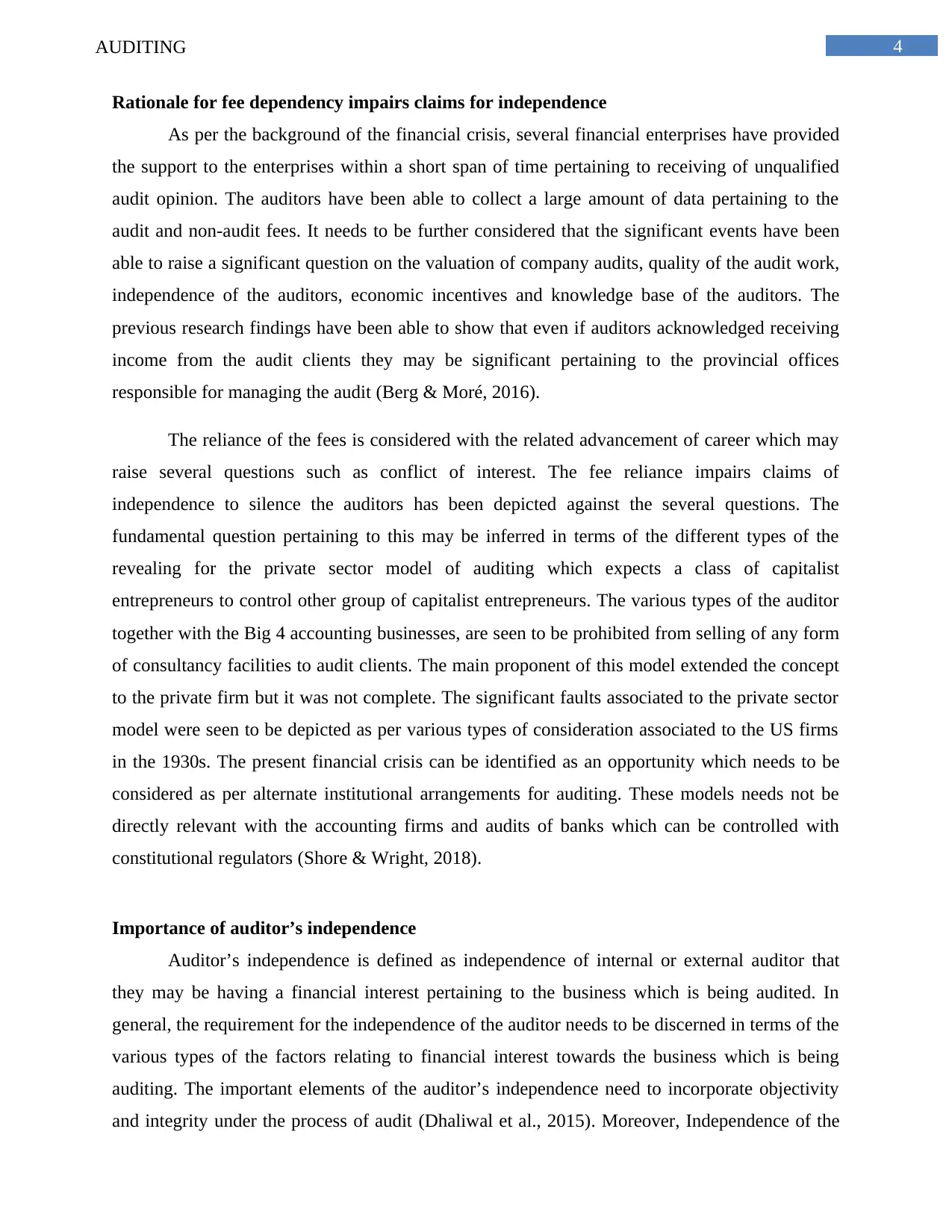
4AUDITING
Rationale for fee dependency impairs claims for independence
As per the background of the financial crisis, several financial enterprises have provided
the support to the enterprises within a short span of time pertaining to receiving of unqualified
audit opinion. The auditors have been able to collect a large amount of data pertaining to the
audit and non-audit fees. It needs to be further considered that the significant events have been
able to raise a significant question on the valuation of company audits, quality of the audit work,
independence of the auditors, economic incentives and knowledge base of the auditors. The
previous research findings have been able to show that even if auditors acknowledged receiving
income from the audit clients they may be significant pertaining to the provincial offices
responsible for managing the audit (Berg & Moré, 2016).
The reliance of the fees is considered with the related advancement of career which may
raise several questions such as conflict of interest. The fee reliance impairs claims of
independence to silence the auditors has been depicted against the several questions. The
fundamental question pertaining to this may be inferred in terms of the different types of the
revealing for the private sector model of auditing which expects a class of capitalist
entrepreneurs to control other group of capitalist entrepreneurs. The various types of the auditor
together with the Big 4 accounting businesses, are seen to be prohibited from selling of any form
of consultancy facilities to audit clients. The main proponent of this model extended the concept
to the private firm but it was not complete. The significant faults associated to the private sector
model were seen to be depicted as per various types of consideration associated to the US firms
in the 1930s. The present financial crisis can be identified as an opportunity which needs to be
considered as per alternate institutional arrangements for auditing. These models needs not be
directly relevant with the accounting firms and audits of banks which can be controlled with
constitutional regulators (Shore & Wright, 2018).
Importance of auditor’s independence
Auditor’s independence is defined as independence of internal or external auditor that
they may be having a financial interest pertaining to the business which is being audited. In
general, the requirement for the independence of the auditor needs to be discerned in terms of the
various types of the factors relating to financial interest towards the business which is being
auditing. The important elements of the auditor’s independence need to incorporate objectivity
and integrity under the process of audit (Dhaliwal et al., 2015). Moreover, Independence of the
Rationale for fee dependency impairs claims for independence
As per the background of the financial crisis, several financial enterprises have provided
the support to the enterprises within a short span of time pertaining to receiving of unqualified
audit opinion. The auditors have been able to collect a large amount of data pertaining to the
audit and non-audit fees. It needs to be further considered that the significant events have been
able to raise a significant question on the valuation of company audits, quality of the audit work,
independence of the auditors, economic incentives and knowledge base of the auditors. The
previous research findings have been able to show that even if auditors acknowledged receiving
income from the audit clients they may be significant pertaining to the provincial offices
responsible for managing the audit (Berg & Moré, 2016).
The reliance of the fees is considered with the related advancement of career which may
raise several questions such as conflict of interest. The fee reliance impairs claims of
independence to silence the auditors has been depicted against the several questions. The
fundamental question pertaining to this may be inferred in terms of the different types of the
revealing for the private sector model of auditing which expects a class of capitalist
entrepreneurs to control other group of capitalist entrepreneurs. The various types of the auditor
together with the Big 4 accounting businesses, are seen to be prohibited from selling of any form
of consultancy facilities to audit clients. The main proponent of this model extended the concept
to the private firm but it was not complete. The significant faults associated to the private sector
model were seen to be depicted as per various types of consideration associated to the US firms
in the 1930s. The present financial crisis can be identified as an opportunity which needs to be
considered as per alternate institutional arrangements for auditing. These models needs not be
directly relevant with the accounting firms and audits of banks which can be controlled with
constitutional regulators (Shore & Wright, 2018).
Importance of auditor’s independence
Auditor’s independence is defined as independence of internal or external auditor that
they may be having a financial interest pertaining to the business which is being audited. In
general, the requirement for the independence of the auditor needs to be discerned in terms of the
various types of the factors relating to financial interest towards the business which is being
auditing. The important elements of the auditor’s independence need to incorporate objectivity
and integrity under the process of audit (Dhaliwal et al., 2015). Moreover, Independence of the
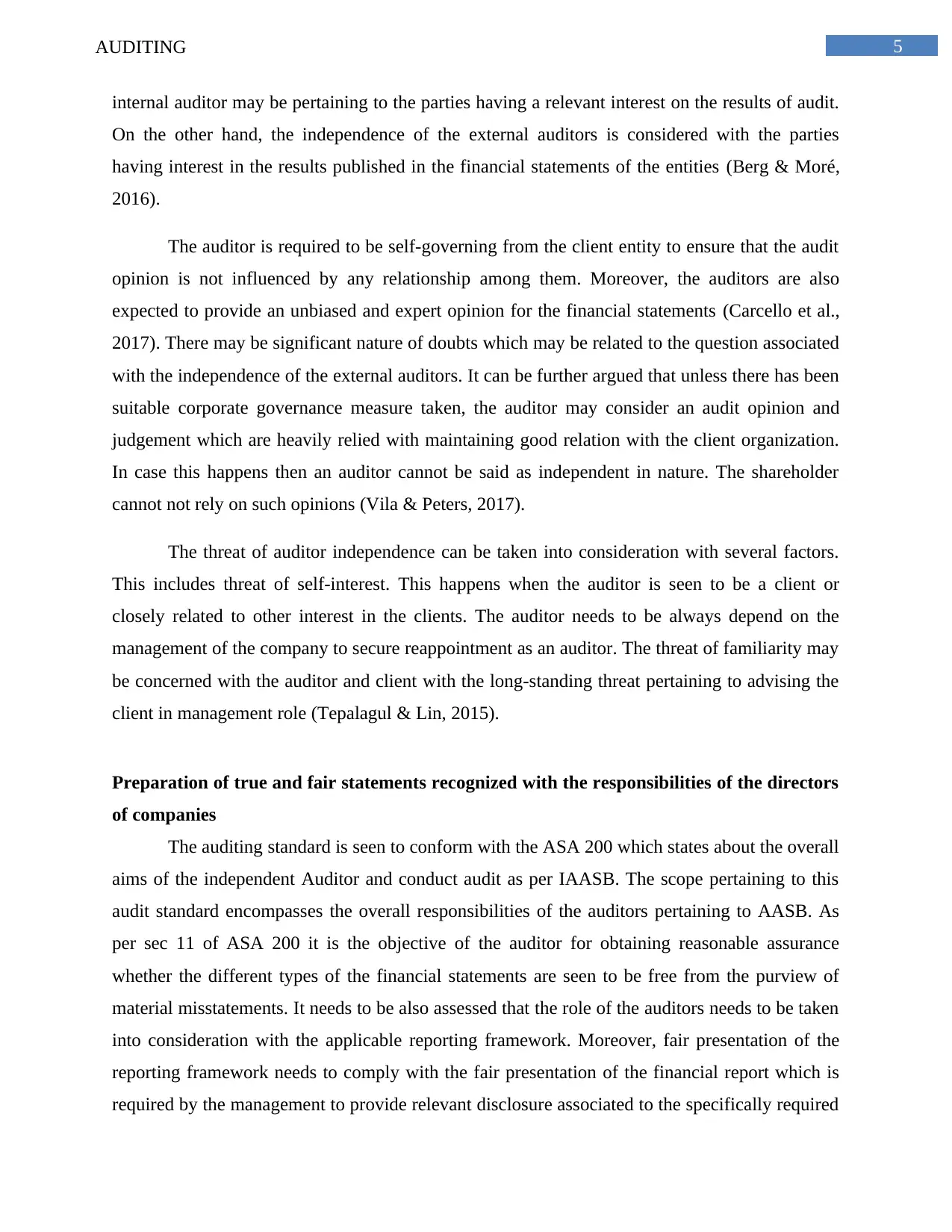
5AUDITING
internal auditor may be pertaining to the parties having a relevant interest on the results of audit.
On the other hand, the independence of the external auditors is considered with the parties
having interest in the results published in the financial statements of the entities (Berg & Moré,
2016).
The auditor is required to be self-governing from the client entity to ensure that the audit
opinion is not influenced by any relationship among them. Moreover, the auditors are also
expected to provide an unbiased and expert opinion for the financial statements (Carcello et al.,
2017). There may be significant nature of doubts which may be related to the question associated
with the independence of the external auditors. It can be further argued that unless there has been
suitable corporate governance measure taken, the auditor may consider an audit opinion and
judgement which are heavily relied with maintaining good relation with the client organization.
In case this happens then an auditor cannot be said as independent in nature. The shareholder
cannot not rely on such opinions (Vila & Peters, 2017).
The threat of auditor independence can be taken into consideration with several factors.
This includes threat of self-interest. This happens when the auditor is seen to be a client or
closely related to other interest in the clients. The auditor needs to be always depend on the
management of the company to secure reappointment as an auditor. The threat of familiarity may
be concerned with the auditor and client with the long-standing threat pertaining to advising the
client in management role (Tepalagul & Lin, 2015).
Preparation of true and fair statements recognized with the responsibilities of the directors
of companies
The auditing standard is seen to conform with the ASA 200 which states about the overall
aims of the independent Auditor and conduct audit as per IAASB. The scope pertaining to this
audit standard encompasses the overall responsibilities of the auditors pertaining to AASB. As
per sec 11 of ASA 200 it is the objective of the auditor for obtaining reasonable assurance
whether the different types of the financial statements are seen to be free from the purview of
material misstatements. It needs to be also assessed that the role of the auditors needs to be taken
into consideration with the applicable reporting framework. Moreover, fair presentation of the
reporting framework needs to comply with the fair presentation of the financial report which is
required by the management to provide relevant disclosure associated to the specifically required
internal auditor may be pertaining to the parties having a relevant interest on the results of audit.
On the other hand, the independence of the external auditors is considered with the parties
having interest in the results published in the financial statements of the entities (Berg & Moré,
2016).
The auditor is required to be self-governing from the client entity to ensure that the audit
opinion is not influenced by any relationship among them. Moreover, the auditors are also
expected to provide an unbiased and expert opinion for the financial statements (Carcello et al.,
2017). There may be significant nature of doubts which may be related to the question associated
with the independence of the external auditors. It can be further argued that unless there has been
suitable corporate governance measure taken, the auditor may consider an audit opinion and
judgement which are heavily relied with maintaining good relation with the client organization.
In case this happens then an auditor cannot be said as independent in nature. The shareholder
cannot not rely on such opinions (Vila & Peters, 2017).
The threat of auditor independence can be taken into consideration with several factors.
This includes threat of self-interest. This happens when the auditor is seen to be a client or
closely related to other interest in the clients. The auditor needs to be always depend on the
management of the company to secure reappointment as an auditor. The threat of familiarity may
be concerned with the auditor and client with the long-standing threat pertaining to advising the
client in management role (Tepalagul & Lin, 2015).
Preparation of true and fair statements recognized with the responsibilities of the directors
of companies
The auditing standard is seen to conform with the ASA 200 which states about the overall
aims of the independent Auditor and conduct audit as per IAASB. The scope pertaining to this
audit standard encompasses the overall responsibilities of the auditors pertaining to AASB. As
per sec 11 of ASA 200 it is the objective of the auditor for obtaining reasonable assurance
whether the different types of the financial statements are seen to be free from the purview of
material misstatements. It needs to be also assessed that the role of the auditors needs to be taken
into consideration with the applicable reporting framework. Moreover, fair presentation of the
reporting framework needs to comply with the fair presentation of the financial report which is
required by the management to provide relevant disclosure associated to the specifically required
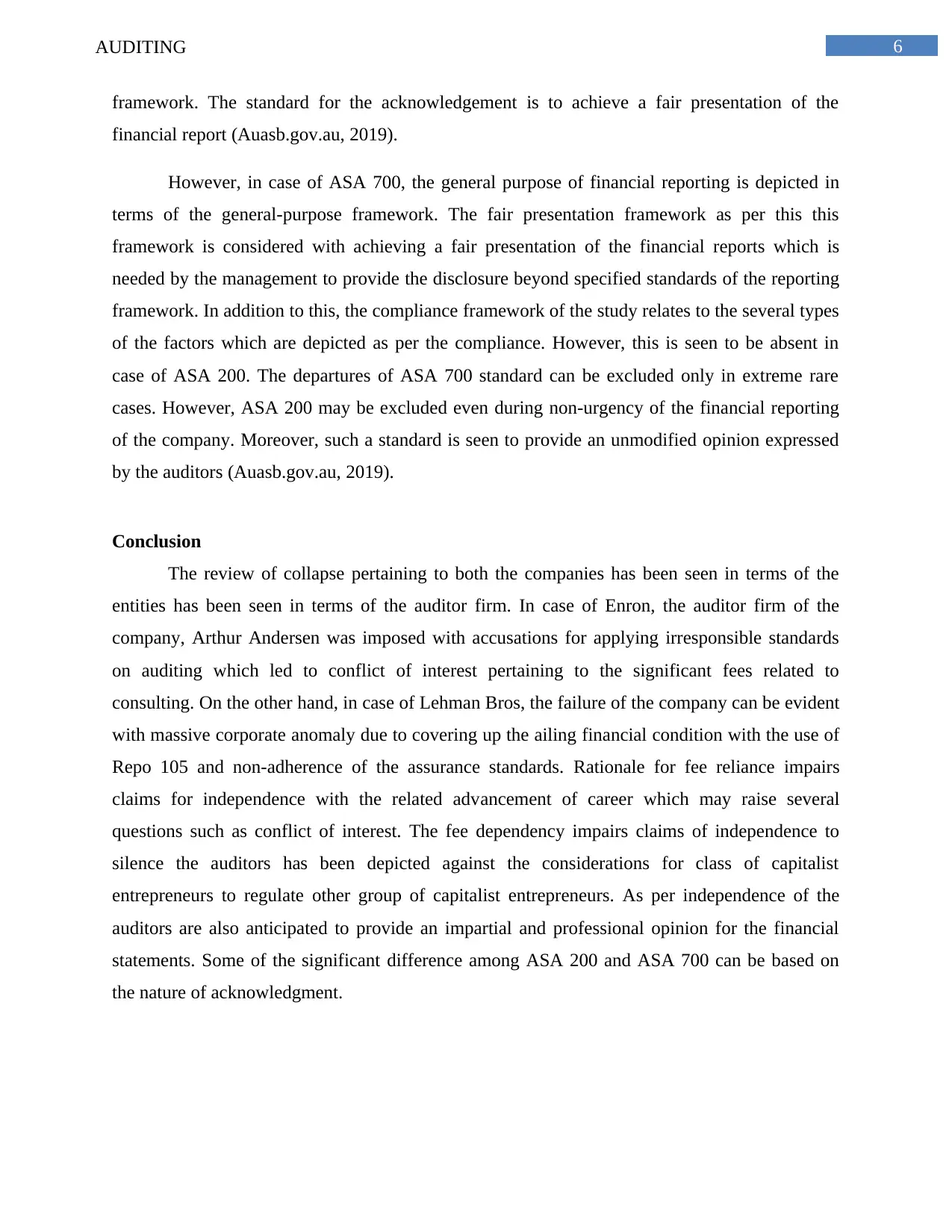
6AUDITING
framework. The standard for the acknowledgement is to achieve a fair presentation of the
financial report (Auasb.gov.au, 2019).
However, in case of ASA 700, the general purpose of financial reporting is depicted in
terms of the general-purpose framework. The fair presentation framework as per this this
framework is considered with achieving a fair presentation of the financial reports which is
needed by the management to provide the disclosure beyond specified standards of the reporting
framework. In addition to this, the compliance framework of the study relates to the several types
of the factors which are depicted as per the compliance. However, this is seen to be absent in
case of ASA 200. The departures of ASA 700 standard can be excluded only in extreme rare
cases. However, ASA 200 may be excluded even during non-urgency of the financial reporting
of the company. Moreover, such a standard is seen to provide an unmodified opinion expressed
by the auditors (Auasb.gov.au, 2019).
Conclusion
The review of collapse pertaining to both the companies has been seen in terms of the
entities has been seen in terms of the auditor firm. In case of Enron, the auditor firm of the
company, Arthur Andersen was imposed with accusations for applying irresponsible standards
on auditing which led to conflict of interest pertaining to the significant fees related to
consulting. On the other hand, in case of Lehman Bros, the failure of the company can be evident
with massive corporate anomaly due to covering up the ailing financial condition with the use of
Repo 105 and non-adherence of the assurance standards. Rationale for fee reliance impairs
claims for independence with the related advancement of career which may raise several
questions such as conflict of interest. The fee dependency impairs claims of independence to
silence the auditors has been depicted against the considerations for class of capitalist
entrepreneurs to regulate other group of capitalist entrepreneurs. As per independence of the
auditors are also anticipated to provide an impartial and professional opinion for the financial
statements. Some of the significant difference among ASA 200 and ASA 700 can be based on
the nature of acknowledgment.
framework. The standard for the acknowledgement is to achieve a fair presentation of the
financial report (Auasb.gov.au, 2019).
However, in case of ASA 700, the general purpose of financial reporting is depicted in
terms of the general-purpose framework. The fair presentation framework as per this this
framework is considered with achieving a fair presentation of the financial reports which is
needed by the management to provide the disclosure beyond specified standards of the reporting
framework. In addition to this, the compliance framework of the study relates to the several types
of the factors which are depicted as per the compliance. However, this is seen to be absent in
case of ASA 200. The departures of ASA 700 standard can be excluded only in extreme rare
cases. However, ASA 200 may be excluded even during non-urgency of the financial reporting
of the company. Moreover, such a standard is seen to provide an unmodified opinion expressed
by the auditors (Auasb.gov.au, 2019).
Conclusion
The review of collapse pertaining to both the companies has been seen in terms of the
entities has been seen in terms of the auditor firm. In case of Enron, the auditor firm of the
company, Arthur Andersen was imposed with accusations for applying irresponsible standards
on auditing which led to conflict of interest pertaining to the significant fees related to
consulting. On the other hand, in case of Lehman Bros, the failure of the company can be evident
with massive corporate anomaly due to covering up the ailing financial condition with the use of
Repo 105 and non-adherence of the assurance standards. Rationale for fee reliance impairs
claims for independence with the related advancement of career which may raise several
questions such as conflict of interest. The fee dependency impairs claims of independence to
silence the auditors has been depicted against the considerations for class of capitalist
entrepreneurs to regulate other group of capitalist entrepreneurs. As per independence of the
auditors are also anticipated to provide an impartial and professional opinion for the financial
statements. Some of the significant difference among ASA 200 and ASA 700 can be based on
the nature of acknowledgment.
Paraphrase This Document
Need a fresh take? Get an instant paraphrase of this document with our AI Paraphraser
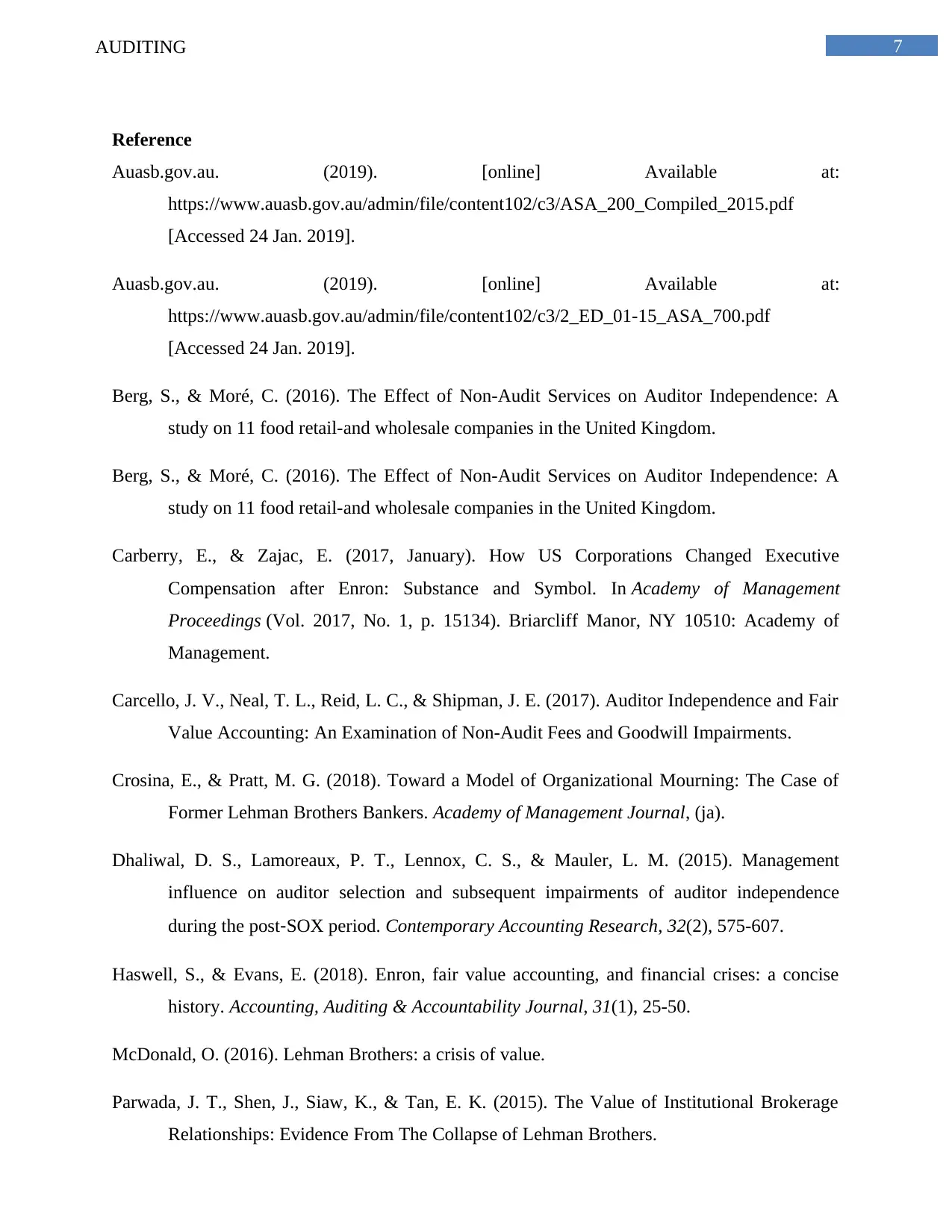
7AUDITING
Reference
Auasb.gov.au. (2019). [online] Available at:
https://www.auasb.gov.au/admin/file/content102/c3/ASA_200_Compiled_2015.pdf
[Accessed 24 Jan. 2019].
Auasb.gov.au. (2019). [online] Available at:
https://www.auasb.gov.au/admin/file/content102/c3/2_ED_01-15_ASA_700.pdf
[Accessed 24 Jan. 2019].
Berg, S., & Moré, C. (2016). The Effect of Non-Audit Services on Auditor Independence: A
study on 11 food retail-and wholesale companies in the United Kingdom.
Berg, S., & Moré, C. (2016). The Effect of Non-Audit Services on Auditor Independence: A
study on 11 food retail-and wholesale companies in the United Kingdom.
Carberry, E., & Zajac, E. (2017, January). How US Corporations Changed Executive
Compensation after Enron: Substance and Symbol. In Academy of Management
Proceedings (Vol. 2017, No. 1, p. 15134). Briarcliff Manor, NY 10510: Academy of
Management.
Carcello, J. V., Neal, T. L., Reid, L. C., & Shipman, J. E. (2017). Auditor Independence and Fair
Value Accounting: An Examination of Non-Audit Fees and Goodwill Impairments.
Crosina, E., & Pratt, M. G. (2018). Toward a Model of Organizational Mourning: The Case of
Former Lehman Brothers Bankers. Academy of Management Journal, (ja).
Dhaliwal, D. S., Lamoreaux, P. T., Lennox, C. S., & Mauler, L. M. (2015). Management
influence on auditor selection and subsequent impairments of auditor independence
during the post‐SOX period. Contemporary Accounting Research, 32(2), 575-607.
Haswell, S., & Evans, E. (2018). Enron, fair value accounting, and financial crises: a concise
history. Accounting, Auditing & Accountability Journal, 31(1), 25-50.
McDonald, O. (2016). Lehman Brothers: a crisis of value.
Parwada, J. T., Shen, J., Siaw, K., & Tan, E. K. (2015). The Value of Institutional Brokerage
Relationships: Evidence From The Collapse of Lehman Brothers.
Reference
Auasb.gov.au. (2019). [online] Available at:
https://www.auasb.gov.au/admin/file/content102/c3/ASA_200_Compiled_2015.pdf
[Accessed 24 Jan. 2019].
Auasb.gov.au. (2019). [online] Available at:
https://www.auasb.gov.au/admin/file/content102/c3/2_ED_01-15_ASA_700.pdf
[Accessed 24 Jan. 2019].
Berg, S., & Moré, C. (2016). The Effect of Non-Audit Services on Auditor Independence: A
study on 11 food retail-and wholesale companies in the United Kingdom.
Berg, S., & Moré, C. (2016). The Effect of Non-Audit Services on Auditor Independence: A
study on 11 food retail-and wholesale companies in the United Kingdom.
Carberry, E., & Zajac, E. (2017, January). How US Corporations Changed Executive
Compensation after Enron: Substance and Symbol. In Academy of Management
Proceedings (Vol. 2017, No. 1, p. 15134). Briarcliff Manor, NY 10510: Academy of
Management.
Carcello, J. V., Neal, T. L., Reid, L. C., & Shipman, J. E. (2017). Auditor Independence and Fair
Value Accounting: An Examination of Non-Audit Fees and Goodwill Impairments.
Crosina, E., & Pratt, M. G. (2018). Toward a Model of Organizational Mourning: The Case of
Former Lehman Brothers Bankers. Academy of Management Journal, (ja).
Dhaliwal, D. S., Lamoreaux, P. T., Lennox, C. S., & Mauler, L. M. (2015). Management
influence on auditor selection and subsequent impairments of auditor independence
during the post‐SOX period. Contemporary Accounting Research, 32(2), 575-607.
Haswell, S., & Evans, E. (2018). Enron, fair value accounting, and financial crises: a concise
history. Accounting, Auditing & Accountability Journal, 31(1), 25-50.
McDonald, O. (2016). Lehman Brothers: a crisis of value.
Parwada, J. T., Shen, J., Siaw, K., & Tan, E. K. (2015). The Value of Institutional Brokerage
Relationships: Evidence From The Collapse of Lehman Brothers.
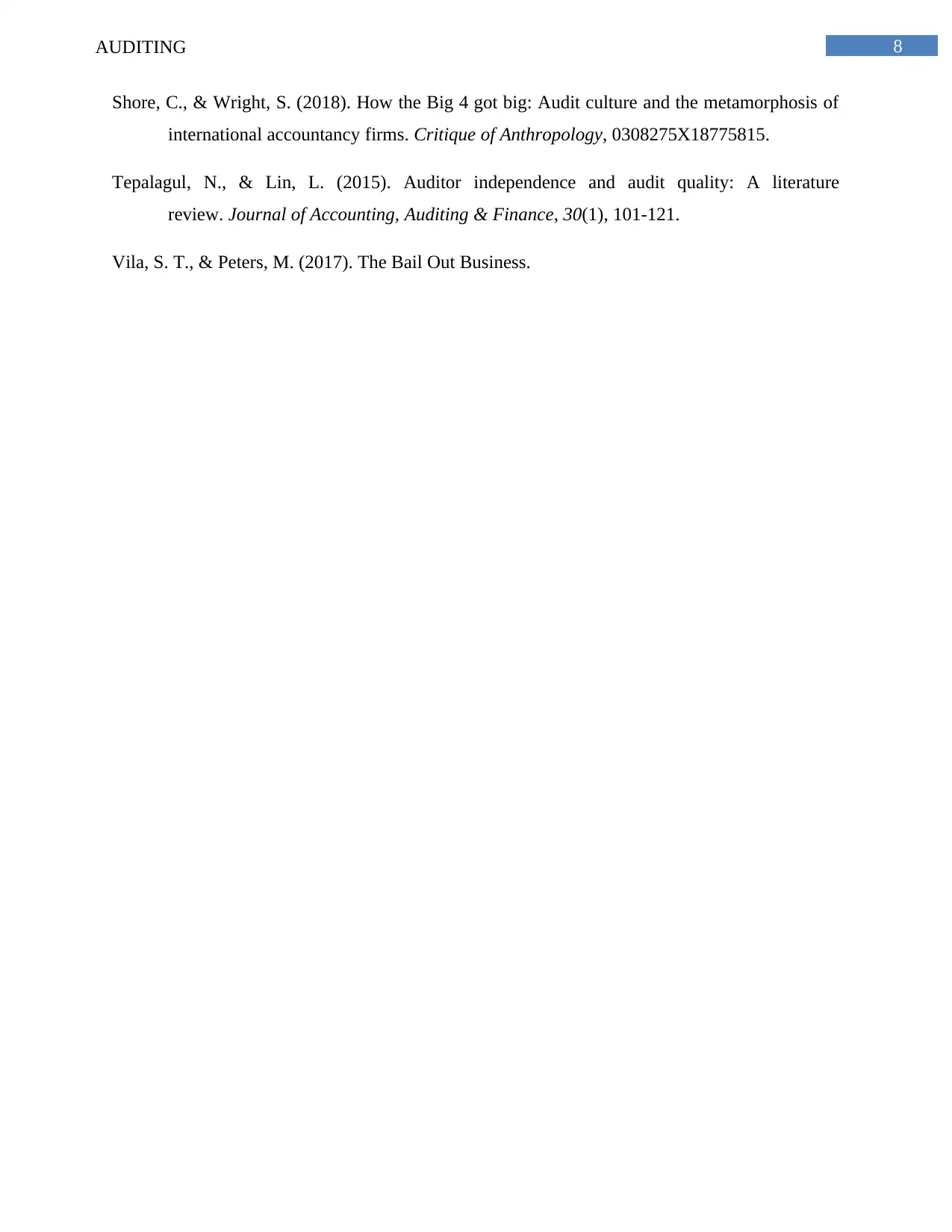
8AUDITING
Shore, C., & Wright, S. (2018). How the Big 4 got big: Audit culture and the metamorphosis of
international accountancy firms. Critique of Anthropology, 0308275X18775815.
Tepalagul, N., & Lin, L. (2015). Auditor independence and audit quality: A literature
review. Journal of Accounting, Auditing & Finance, 30(1), 101-121.
Vila, S. T., & Peters, M. (2017). The Bail Out Business.
Shore, C., & Wright, S. (2018). How the Big 4 got big: Audit culture and the metamorphosis of
international accountancy firms. Critique of Anthropology, 0308275X18775815.
Tepalagul, N., & Lin, L. (2015). Auditor independence and audit quality: A literature
review. Journal of Accounting, Auditing & Finance, 30(1), 101-121.
Vila, S. T., & Peters, M. (2017). The Bail Out Business.
1 out of 9
Related Documents
Your All-in-One AI-Powered Toolkit for Academic Success.
+13062052269
info@desklib.com
Available 24*7 on WhatsApp / Email
![[object Object]](/_next/static/media/star-bottom.7253800d.svg)
Unlock your academic potential
© 2024 | Zucol Services PVT LTD | All rights reserved.




